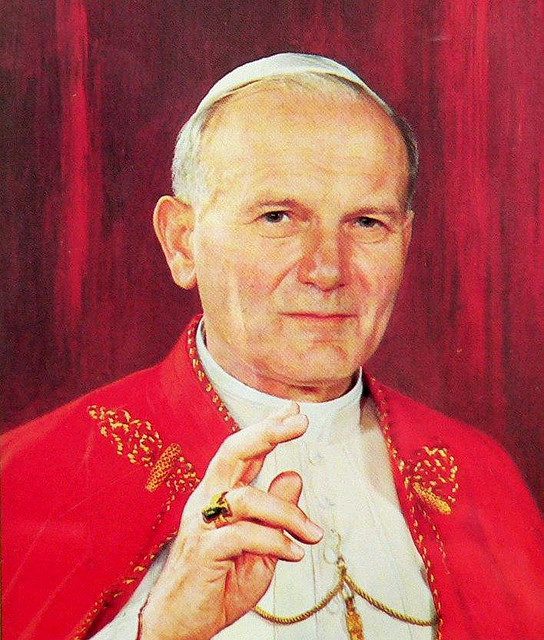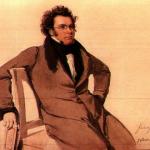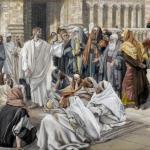
[Pope-bashing didn’t start with Pope Francis. I compiled the following on 9 April 2005, with additions in 2011]
***
Christopher Ferrara
(co-author of “the most feared book in Neo-Catholic Land”: The Great Facade)
. . . . This brings us to the heart of the matter: How is it that a world in the grip of apostasy had nothing but praise for the Pope whose moral teaching it simply ignored? On every major television network politicians of the Left and the Right, conservative and liberal journalists and political commentators, Protestant ministers, rabbis, Imams, Hindus and Buddhists, rock stars and even MTV video jockeys–spokesmen of every conceivable persuasion and political orientation nanimously offered unstinting tribute to the Pope.
How does one explain this seeming paradox? . . . there has to be more to the explanation than this, for the Church has never seen anything like the unceasing hosannas offered to John Paul II by virtually every organ of world opinion. Far more is involved here than the usual expressions of worldly respect for a deceased Pope. What is going on?
. . . The conclusion is inescapable: Whatever the Pope’s subjective intentions might have been (and these are known only to God), the world’s unprecedented praise for John Paul II clearly arises from the perception that his pontificate, unlike any other, served the world’s interests as opposed to the “narrow” sectarian interests of the Roman Catholic Church.
. . . How did this perception arise? Is the world not responding to the Church’s own “opening” to it at the Council? Is the world not rejoicing in the legacy of a Pope it sees as having, at long last, brought the Church down to earth, dispelling once and for all its aura of divine majesty as the one and only City of God, ruled by a king who is Christ’s Vicar?
. . . EWTN’s implicit denigration of the preconciliar Popes (a basic element of neo-Catholic thinking) continued on Marcus Grodi’s show The Journey Home, where Grodi opined that John Paul II had made Protestants “feel welcome” in the Church, whereas before his reign “there was not that welcome.”
. . . In the eyes of the world, then, John Paul II is more worthy of admiration than any Pope before him because he, unlike any of his predecessors, was willing to lend credence to many of the world’s accusations against the Church, especially the accusations of the Jews . . . Here, as in so many other areas, we see the contradictory nature of the pontificate that has just ended. And it is precisely these contradictions the world now exploits in its great show of adulation for one Pope above all others. What Catholic would want to assist in the exploitation by failing to protest, as a Catholic should, that no Pope is utterly inerrant, and that not everything John Paul II said and did was in the best interest of the Church or a model for other popes to follow?
For 26 years the neo-Catholic establishment chanted: “John Paul II, we love you!” But did they love the Pope as a Pope should be loved, in charity and in truth, being willing, as St. Thomas teaches, to admonish even the Pope should the danger of scandal to the Faith arise? Or did they love instead the cult they themselves had built up around the man in sports stadiums and at the World Youth Days?
As he viewed the Pope lying in state in St. Peter’s Basilica during EWTN’s coverage, Marcus Grodi said that people must develop an appreciation not only for the Catholic faith, “but for the meaning of John Paul II.” When the person of a Pope is raised to the level of a “meaning” that is held to be something over and above the Faith itself, we are witnessing a process of papal deification that is foreign to our religion and must arouse in us no little fear of what is to come in the days ahead.
. . . We who call ourselves traditionalists can only object to this whole eerie spectacle, the likes of which the Church has never seen before. Whoever wishes to love the Pope as he ought to be loved must be willing to say now, in charity and in truth, that John Paul II was a ruler whose words often said one thing while his actions said another, and that the contradictions which marked his reign have produced enormous confusion in the Church that must be undone by his successor. (From: “Did They Love You, Pope John Paul II?”)
Michael J. Matt
(editor of The Remnant)
. . . While watching some of the constant live feed from the Eternal City this past week, compliments of the cable news networks, it occurred to me to wonder if we were not perhaps viewing, in a sense, a Requiem for the old Catholic Faith itself. For whatever his strengths and weaknesses, Pope John Paul II is likely the last Pontiff who will have deep roots in the old Church and who will have clear memories of the way the Church once was but is no more. His pontificate was the bridge from the old to the new; with his passing, the bridge is no more. The next Pope is apt to have had his priestly formation solidly rooted in the new Church of Vatican II.
. . . As traditional Catholics we felt so terribly alone this past week, asking, even as Mary Magdalene asked at the tomb, “What have you done with him? What has become of the Catholic Pope?” One priest commentator on Fox News summed it up perfectly: “Previous popes were popes of the Catholic Church; Pope John Paul was the pope of the world!” With few exceptions, they praised him, they eulogized him, some even seemed intent upon deifying him. What does it all mean? Humanly speaking, it may well mean that the Revolution has triumphed, or at least believes that it has triumphed, to such an extent over the past fifty years, and the Catholic Church has fallen so low in her human element, that the world no longer fears her or her human leaders. In its heart and soul, of course, the world knows that there is only one true Church and that it is the Catholic Church. But in true demonic fashion, the world also seems eager to test its apparent triumph over the Church by holding aloft like some trophy the Catholic pope and saying: “Wasn’t he a great man! He was one of us.” The same world that vilifies Pius XII on a daily basis now claims Pope John Paul as one of its own. Indeed, these are dangerous times.
. . . this long and in so many respects tragic pontificate, . . .
. . . Now, at the eleventh hour, it is time, it seems to us, for Catholics to beg God on bended knee to arrange it so that the next Pope will be given the grace to see the absolute necessity of abolishing that catastrophic experiment called the New Mass—that unmitigated disaster that has failed so completely to preserve and protect the Faith, and that has, instead, proven itself expertly capable of destroying within the Catholic masses the belief in the Real Presence—once and for all, while using the full weight of his august office to reinstate the sacred Mass of the Roman Rite…the Mass of the Saints…the Mass of the Ages…the Mass of Tradition! (From: “On the Eve of Another Conclave”)
Robert Sungenis
Whereas in Noah’s day there were only eight people saved while the rest were condemned when the doors of the ark were shut (1 Pt 3:20), quite the opposite is taking place today, and John Paul II comes very close on many occasions to declaring that everyone in the world will be saved. Right from the beginning of his pontificate, starting from his 1979 encyclical Redemptor Hominis (an encyclical, incidentally, which uses “church” 150 times but does not mention “Catholic” once), to his January 2002 gathering of 160 world religions at Assisi to “pray” for world peace, John Paul II has given us a steady stream of universalist-type messages, but he has preached little, if any, messages of judgment and condemnation of the world for its sins.
I believe John Paul II does this because the essence of his “ecumenical” gospel appears to be that man is saved until proven otherwise, whereas our traditional gospel holds, as Noah did, that man is under condemnation until he is saved.
. . . Other men have been branded as heretics for saying things not half as troublesome as some of the above statements.
. . . As it stands, there are many other things John Paul II has said and done that make it hard for one to be defensive of his teachings in the light of tradition.
. . . Although one cannot possibly cover all of them in one essay, there are, in fact, many such alarming and troubling statements made by the pope in Crossing the Threshold of Hope.
. . . It appears from his writings and teachings, however, that John Paul II has gone sufficiently beyond both Scripture and conciliar teaching to warrant our sincere concern about his basic understanding of how salvation is procured and to whom it might be given. More to the point, I think it would be no exaggeration to say that it is precisely John Paul’s view that every man is a recipient of ‘salvation until proven otherwise’ which is behind all the “ecumenical activities” . . .
The pope’s liberal views on salvation . . . (From: “When a Pope Errs”; published at The Remnant)
***
[Dave, on 3-2-18: For a direct, demonstrable connection between this bashing of Pope John Paul the Great and the present bashing of Pope Francis, see my documentation of the opposition of many of the signatories of the Correctio, to Pope St. John Paul II’s beatification or canonization. Search “John Paul II” in this paper. There are 13 appearances. Michael Voris savaged Pope Benedict XVI’s resignation and accused him of abandoning his flock (he called the resignation “immoral”) and exaggerating his illness: another pathetic theme that is seen more and more as of late (example). Even his liturgical opinions are rejected.]
***
(originally 4-9-05 + 4-25-11 + 6-1-11)
Photo credit: Pope St. John Paul II [Flickr / CC BY 2.0 license]
***













